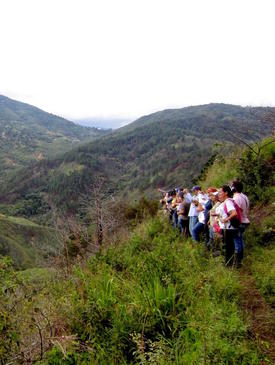Tropical Forest Restoration in Human-Dominated Landscapes (English)
Summary
ELTI invites participants to explore the social, biological, and political processes that shape reforestation and forest restoration in tropical regions. This course is designed for a diverse audience, including management professionals, policy makers, mid-career practitioners and others involved with natural resource management, land use decision-making, forest finance, or landscape restoration.
English Language
Duration: 6 weeks
6-8 hours/week
$1,200 USD - Early Registration (before August 15)
$1,300 USD - Regular Registration
*Limited partial scholarships available based on demonstrated need
Apply by September 1, 2017. Applications will be evaluated on a rolling basis until all positions are filled, after which there will be a waiting list. Payment is due by September 10 in order to confirm enrollment in the course.
Content
About the course:
This course course provides a unique opportunity to interact with environmental leaders and Yale F&ES faculty to learn about an issue of immense importance for the sustainability of tropical forest landscapes. Participants will learn about the following aspects, with a focus on tropical Asia, Africa, and the Neotropics:
- Technical aspects of forest restoration in different biophysical and social contexts
- Social, financial, and political catalysts and challenges
- Protocols for monitoring and evaluating restoration for diverse objectives
Course Structure:
The course is divided into six modules, each lasting one week. Each module includes videos, readings, resources, discussions, and assignments, all of which are completed at the pace of the participant. In addition, participants will have the opportunity to meet once a week with Yale professors, guest experts, and course participants during live online discussions. Live discussion sessions will tentatively be scheduled from 9:00-10:20 am Eastern Standard Time each Wednesday during the course.
Week 1: Ecology, disturbance, and regeneration potential of tropical forests
Week 2: Socio-cultural and political aspects of restoration
Week 3: Effective practices and strategies for restoration
Week 4: Integration of restoration and production goals
Week 5: Monitoring of restoration projects
Week 6: Evaluating restoration and reforestation projects
At the end of the course, participants will receive a certificate of completion from ELTI.
This course will be delivered by ELTI Staff Facilitators and Lead Professor:
Mark S. Ashton, Ph.D.
Morris K. Jesup Professor of Silviculture and Forest Ecology and Director of School Forests, Yale University, School of Forestry & Environmental Studies.
Dr. Mark Ashton has over 30 years of experience researching and teaching about the biological and physical processes governing the regeneration of natural forests and on the creation of their agroforestry analogs. In particular, he seeks a better understanding of regeneration establishment among assemblages of closely related trees. His long-term research concentrates on tropical and temperate forests of the Asian and American realms. The results of his research have been applied to the development and testing of silvicultural techniques for restoration of degraded lands and for the management of natural forests for a variety of timber and nontimber products.
Other Yale faculty and ELTI partners will participate in live discussion sessions throughout the course.
Cost and Course Features:
The cost of the course is USD $1,300. This cost includes registration, course materials, and the certificate of completion. Limited scholarships are available based on demonstrated need. In addition, our online courses provide a complete and enriching training experience by allowing participants to:
- Access ELTI’s resources and expertise: ELTI specializes in developing and delivering high-quality training experiences for environmental leaders in the tropics. Course participants are presented with key concepts through professionally developed materials designed by Yale University faculty, ELTI staff members, and international partners. These materials employ a variety of teaching tools, including interactive presentations, pre-recorded video lectures, and diverse readings.
- Access international experts and experience: ELTI has a strong emphasis on providing participants with diverse international perspectives, which are presented through case studies and on-the-ground examples from the Philippines, Indonesia, Thailand, Colombia, Mexico, Brazil, Panama, and Sri Lanka.
- Receive customized instruction and personal attention: ELTI’s online courses provide the opportunity for live discussions with guest experts, personalized feedback, and relating homework assignments to the individual needs and interests of the participants.
- Interact with a diverse community of participants: By participating in ELTI’s online course, participants provide peer-to-peer feedback, work in global virtual teams, become part of a “community of learners” during and after the course, and benefit from the diverse experiences of environmental practitioners worldwide.
- Develop practical skills: The homework assignments during the course are designed to help participants develop practical skillsets that they can apply to their careers.


